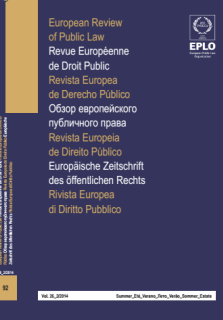
LA SOLIDARITÉ, UN CONCEPT JURIDIQUE?
ÉTUDE DU CONCEPT
DANS LA CHARTE DES DROITS FONDAMENTAUX
DE L'UNION EUROPÉENNE
FABIENNE PÉRALDI LENEUF
Professeur à l'Université Lille 2
The legal concept of "solidarity" brings into play the responsibility of public authorities towards society. The Lisbon Treaty thus grants it a multi-faceted function: economic and social cohesion, fight against exclusion and poverty, or solidarity between Member States and between European Union and Member States. The Charter of Fundamental Rights of the European Union presents the interest to devote to the concept of solidarity for the first time in a basic text, a full Title. The social field constitutes its favourite area, however several provisions are inspired by new rights often described as third-generation rights (consumer protection, environmental protection etc.). "Solidarity" in the Charter reflects a synthesis of rights of different source and nature, and proposes a new model. Nevertheless, this model carries within it its own limits: concepts remain vague, reflections of divergent conceptions of the States, which contradicts the affirmed principle of the indivisibility of rights in the preamble and even allows doubts as concerns their effects and therefore their justiciability.
Le concept juridique de "solidarité" met en jeu la responsabilité des autorités publiques à l'égard de la société. Dans le Traité de Lisbonne, la solidarité est envisagée de façon plurielle, sous l'angle de la cohésion économique et sociale, de la lutte contre l'exclusion et la pauvreté, ou encore de la solidarité entre Etats membres et entre l'Union et les Etats. La Charte des droits fondamentaux de l'Union européenne présente l'intérêt de consacrer pour la première fois dans un texte fondamental, un Titre complet à la Solidarité. Le domaine social constitue son champ de prédilection, mais plusieurs dispositions sont inspirées de droits nouveaux, qualifiés souvent de droits de troisième génération (protection des consommateurs, de l'environnement etc.). La "Solidarité" dans la Charte reflète ainsi une synthèse de droits, de source et de nature différentes, et propose un modèle nouveau. Celui-ci, cependant, contient en germe ses limites: les notions sont souvent vagues, reflets des conceptions divergentes des Etats, ce qui contredit le principe de l'indivisibilité des droits affirmé dans le préambule et conduit même à douter de leur portée et donc de leur justiciabilité.





















